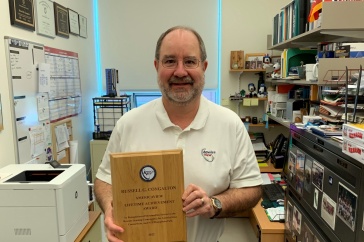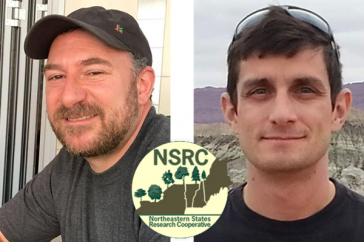 How does life begin and evolve? It is, possibly, the most complex and mystifying scientific puzzle that researchers continue to explore. Scientists at the University of New Hampshire will delve deeper into that puzzle as part of a team of researchers who have received a five-year $8.9 million award from NASA to form an Astrobiology Institute.
How does life begin and evolve? It is, possibly, the most complex and mystifying scientific puzzle that researchers continue to explore. Scientists at the University of New Hampshire will delve deeper into that puzzle as part of a team of researchers who have received a five-year $8.9 million award from NASA to form an Astrobiology Institute.
The UNH team is led by Vaughn Cooper, associate professor of microbiology and genetics. His laboratory joins an interdisciplinary team led by evolutionary geneticist Frank Rosenzweig of the University of Montana at Missoula and researchers from Stanford University, Penn State, and the University of Colorado Boulder. Cooper’s lab will receive $1 million of the award.
"With the Curiosity rover characterizing the potential habitability of Mars, the Kepler mission discovering new planets outside our solar system, and Mars 2020 on the horizon, these research teams will provide the critical interdisciplinary expertise to help interpret data from these missions and future astrobiology-focused missions, " said Jim Green, director, Planetary Science Division, at NASA Headquarters, Washington.
Cooper’s project is titled "Reliving the Past: Experimental Evolution of Major Transitions in the History of Life.” The research that led to this project is supported by the NH Agricultural Experiment Station (NHAES) and a CAREER Award from the National Science Foundation.
“Our program aims to meet the grand challenge of illuminating and interpreting the laws that produce the Darwin’s ‘tangled bank’ so that we may better understand and appreciate the ‘grandeur in this view of life … that, whilst this planet has gone cycling on according to the fixed law of gravity, from so simple a beginning endless forms most beautiful and most wonderful have been, and are being, evolved,” Cooper said, quoting Charles Darwin’s “Origin of the Species.”
Cooper explained that for decades scientists have recognized that cooperative interactions are fundamental features of biological systems, but their origins are largely unknown. With that in mind, Cooper’s team specifically will look at what cooperative forces bring about major transitions in the evolution of biological organisms. Using laboratory evolution experiments with microbial populations, scientists will study genotypes (an organism’s genetic code) and phenotypes (expressed traits of an organism), and the interactions among phenotypes in simple communities.
“Because the principal actors in the first 2.5 billion years of life’s drama were exclusively microbes, we will use these forms to unlock the secrets of life’s transitions from simple units to self-organizing, self-replicating, energy-gathering systems that range in complexity from single cells to ecosystems,” Cooper said.
“A distinctive feature of our approach is that we will study the dynamics of the evolutionary process looking into the future as well as in real time. Because these microbes can be cryogenically preserved, we can create a living fossil record for our genomic analyses,” he said.
The $8.9 million grant is one of five five-year grants totaling $50 million awarded to seven research teams nationwide to study the origins, evolution, distribution, and future of life in the universe. The interdisciplinary teams will become members of the NASA Astrobiology Institute (NAI), headquartered at NASA’s Ames Research Center, Moffett Field, Calif.
-
Written By:
Lori Tyler Gula, PhD | NH Agricultural Experiment Station | lori.gula@unh.edu | 603-862-1452



















































